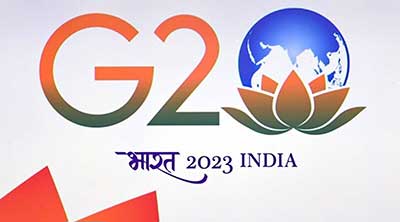Date: 04/02/2023
Relevance: GS-2: Bilateral, regional and global groupings and agreements involving India and/or affecting India’s interests.
Key Phrases: Lifestyle for Environment (LiFE), IEA analysis, individual accountability, decarbonise industries, hard-to-decarbonise industries, Agni Tattva campaign, Panchmahabhoot.
Context:
- The year 2022 has seen the onset of the world’s first truly global energy crisis, with turbulent markets and sharp price spikes creating difficulties for citizens, businesses and governments.
- Although India has been more insulated from the crisis than many countries, it has still been affected.
Lifestyle for Environment (LiFE):
- India’s new Lifestyle for Environment (LiFE) initiative is an important platform that could help lower energy costs, carbon dioxide emissions, air pollution and inequalities in energy consumption.
- LiFE demonstrates India’s leadership on global issues by promoting sustainable lifestyles and consumption choices worldwide.
- The programme could potentially help put developing and advanced economies alike onto a more sustainable path.
- The initiative was launched in October 2022 to nudge individual and
collective action to protect the environment.
- This includes making informed personal choices such as using public transport more, buying electric rather than petrol or diesel vehicles, adopting energy-efficient appliances in homes, and much more.
- The strength of India’s initiative is that it combines individual accountability and policy actions.
- Criticism: While the goal of using energy more efficiently is at the heart of LiFE, the programme doesn’t negate the need for strong policies to accelerate the expansion of clean energy technologies such as solar, wind and hydrogen.
About G20 Countries:
- The G20, or Group of Twenty, is an intergovernmental forum of the world’s major developed and developing economies.
- The G20 comprises 19 countries (Argentina, Australia, Brazil, Canada, China, France, Germany, India, Indonesia, Italy, Japan, Republic of Korea, Mexico, Russia, Saudi Arabia, South Africa, Turkey, UK, USA) and the European Union.
- India has invited Bangladesh, Egypt, Mauritius, the Netherlands, Nigeria, Oman, Singapore, Spain and the UAE as guest countries for the summit in 2023.
- The G20 accounts for about 85 per cent of the global GDP, 75 per cent of international trade and two-thirds of the world’s population.
- This makes it the premier forum for international economic cooperation.
- It also works to address major issues related to the global economy, such as international financial stability, climate change and sustainable development.
(International Energy Agency) IEA Analysis:
- New IEA analysis shows that if all countries were to adopt the kind of measures recommended by LiFE, it would reduce global carbon dioxide emissions by more than 2 billion tonnes by 2030.
- This alone would deliver around one-fifth of the emissions reductions needed this decade to put the world on a path to net zero emissions.
- The measures would also save consumers globally around $440 billion in annual energy bills.
- In the IEA’s analysis, energy demand in developing economies will continue to increase as people strive to improve their living standards.
- Behaviour Change: Evidence suggests the global energy crisis is sparking renewed interest in behaviour change and energy efficiency, particularly in advanced economies that have been heavily affected.
- For instance, the European Union set a goal of reducing its natural gas demand by 15 per cent in response to the crisis.
- It ended up overachieving, with gas demand in buildings falling around 17 per cent in 2022 even as the economy grew.
- While the circumstances are extreme, it shows consumers are willing to take responsibility for the energy they use for the greater good.
Agni Tattva campaign:
- Agni Tattva under LiFE - Lifestyle for environment, was recently launched by the Ministry of Power.
- The aim is to create awareness of the core concept of Agni Tattva, an element that is synonymous with energy and is amongst the five elements of Panchmahabhoot.
Way Forward:
- We need to do many things at once to tackle the world’s environmental challenges while ensuring secure and affordable energy supplies for all.
- More Traditional Policies:
- LiFE’s recommendations can be a valuable complement to more traditional policies.
- For instance, hard-to-decarbonise industries like steel and cement can take a leaf out of LiFE’s book by adopting approaches that use energy and other resources more efficiently.
- Increasing the volume of steel that is recycled can reduce the amount of steel production that needs to be decarbonised.
- Provide appropriate infrastructure, incentives or information.
- We all need to make the right choices when it comes to the environment and sustainability, but often these choices are not supported by appropriate infrastructure, incentives or information.
- For example, public transport in many cities must become more efficient and readily accessible to encourage citizens to leave their cars at home.
- Urban planning needs to be optimised so individuals can live closer to work and to amenities that reduce commute times and encourage walking and cycling.
- Policies are important here to enable sustainable choices by actively supplying alternative options. India’s Ujala scheme to provide affordable and hyper-efficient LED bulbs is a good example.
Conclusion:
- LiFE certainly shouldn’t be seen as only relevant to India and developing economies.
- Its lessons are applicable globally — and could make the biggest difference in advanced economies.
- India’s G20 Presidency represents a unique opportunity to globalise the LiFE initiative — providing a knowledge-sharing platform for other leading economies to realise the impact that LiFE’s recommendations can have in the fight against climate change, air pollution and unaffordable energy bills.
- Since the G20 makes up nearly 80 per cent of global energy demand, meaningful changes by its members can make a big difference.
Source: The Indian Express
Mains Question:
Q. LiFE certainly shouldn’t be seen as only relevant to India and developing economies. Its lessons are applicable globally — and could make the biggest difference in advanced economies. Critically examine the statement. (250 Words)






















